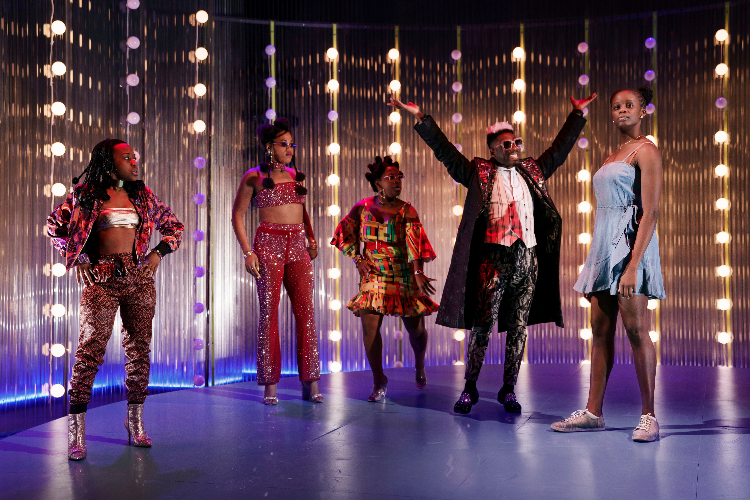If Pretty Hurts Ugly Must Be a Muhfucka
By Tori Sampson; Directed by Leah C. Gardiner
Off Broadway, Play with music
Runs through 3.31.19
Playwrights Horizons, 416 West 42nd Street
by Ken Kaissar on 3.12.19
 Mirirai Sithole, Antoinette Crowe-Legacy, Phumzile Sitole, Rotimi Agbabiaka and Níkę Uche Kadri in
Mirirai Sithole, Antoinette Crowe-Legacy, Phumzile Sitole, Rotimi Agbabiaka and Níkę Uche Kadri in
If Pretty Hurts Ugly Must Be a Muhfucka. Photo by Joan Marcus.
BOTTOM LINE: An energetic new play with music that explores the relationship that African American women have with the notion of beauty and its effect on their self-esteem.
We have a complicated relationship with female beauty. Even if many of us know that beauty has nothing to say about a woman’s character, intelligence, or value, it remains a highly pursued and coveted attribute among women, as if it were a definable standard. Add to that the experience of African American girls growing up with constant images of whiteness as the standard bearer of beauty, and the issue becomes exponentially more complicated. Tori Sampson’s new play illuminates that physical beauty remains a key component of black women’s self-esteem. That’s a difficult truth to grapple with when conventional wisdom tells us that beauty is only skin deep.
The play is set in Affreakah-Amirrorikah, a fictional village that is on a continent that feels a lot like the “Africa” of an American teenager’s imagination. The story follows Akim (Níkę Uche Kadri), a teen universally acknowledged as the most beautiful girl in the village. To protect her from harm, Akim’s parents carefully control with whom she interacts. Naturally, Akim is bursting at the seams to get out and experience life, so when three of her contemporaries (Antoinette Crowe-Legacy, Mirirai Sithole, and Phumzile Sitole) offer to deliver her to a village celebration, it doesn’t take much arm-twisting to convince her to go. Unfortunately, her friends are motivated by jealousy and mean to lure her into grave harm.
Under the direction of Leah C. Gardiner, Playwrights Horizons’ excellent production is a celebration of theatrical design. Louisa Thompson’s set design is simple and perfectly supports the play without adding extraneous or superfluous elements. Dede Ayite’s costumes add color and pizzazz. And Matt Frey’s lighting design is as lively as a nightclub; he brings the audience into the action by keeping them lit with an interesting color palate. Insider tip: keep your program face-up on your lap and glance down as you feel the lights pulsating above you. The program has been coordinated with the lighting design to create a beautiful effect I’ve never seen before.
The ensemble is as glorious as the design elements. You’ll particularly enjoy a performance by Rotimi Agbabiaka who plays the Chorus, and our de facto emcee for the evening, as well as Carla R. Stewart who, as the Voice of the River, delivers a show-stopping vocal performance. Live music accompanies the show with Rona Siddiqui on percussion and keyboard and Erikka Walsh on percussion and bass. The two musicians support the show’s African spirit and are fun to watch on the sidelines as the story progresses.
As glorious as this production is, something about Sampson’s construction feels contradictory and uneven. For starters, the beauty of a young girl hardly feels like an issue important enough to motivate or sustain an entire story. Jealousy of beauty ultimately incites unfortunate tragic events, but for the first half of the play, all of the characters’ preoccupation with beauty can be dismissed as vanity.
In a program insert, Sampson invites us “to make some noise,” and the show’s lively opening, along with the lighting design, makes us believe that audience participation will be a key component of the experience. But the call for participation quickly dissipates and is never brought up again. The play ends with an overused dramatic device common in greener playwrights. What perhaps is intended as a twist in the narrative comes off as an unsatisfying, clichéd ending that outstays its welcome.
Riffing on a West African folktale, Sampson sets out to celebrate and encourage the beauty of black women. Her script bears the following preface: "In a world where Viola Davis is not 'classically beautiful,' First Lady Michelle Obama is compared to an ape...In this world where beauty is placed out of our reach...we reach."
While her sentiment resonates, the play is more successful as a statement on feminine beauty in general as opposed to the beauty of black women specifically. All of the characters are black, so a cross-racial exploration of beauty is never offered. Though the program and Sampson’s script illuminate the complexities of being a black woman in a world where beauty is represented by whiteness, that idea doesn't fully make it onto the stage. That’s not necessarily a problem, unless that is what Sampson intended. I’m sure this play will mean quite a lot to black women, but I don’t see any reason why lots of other women won’t be just as served by its message.
(If Pretty Hurts Ugly Must Be a Muhfucka plays at Playwrights Horizons, 416 West 42nd Street, through March 31, 2019. The running time is 1 hour 50 minutes with no intermission. Performances are Tuesdays and Wednesdays at 7; Thursdays and Fridays at 8; Saturdays at 2:30 and 8; and Sundays at 2:30 and 7:30. Tickets are $49 - $89 and are available at phnyc.org.)
If Pretty Hurts Ugly Must Be a Muhfucka is by Tori Sampson. Directed by Leah C. Gardiner. Choreography by Raja Feather Kelly. Set Design by Louisa Thompson. Costume Design by Dede Ayite. Lighting Design by Matt Frey. Original Music and Sound Design by Ian Scot. Hair and Wig Design by Cookie Jordan. Stage Manager is Alyssa K. Howard.
The cast is Rotimi Agbabiaka, Maechi Aharanwa, Jason Bowen, Antoinette Crowe-Legacy, Leland Fowler, Níkę Uche Kadri, Mirirai Sithole, Phumzile Sitole, Carla R. Stewart, Rona Siddiqui, and Erikka Walsh.

